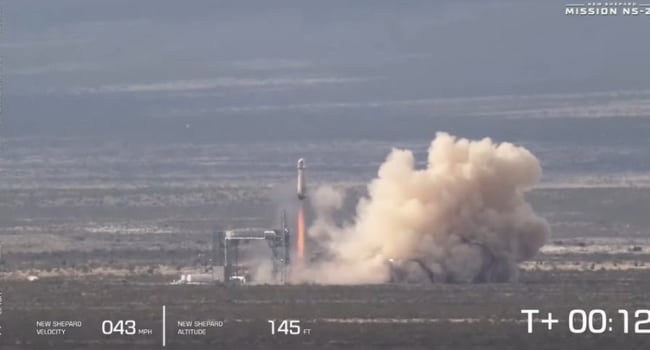
After a 15-month hiatus, Jeff Bezos' Blue Origin successfully launches New Shepard spacecraft into space
Billionaire Jeff Bezos' company, Blue Origin, has resumed suborbital space launches after a 15-month hiatus. The launch of the New Shepard rocket with the N-24 unmanned mission took place on Tuesday, December 19, at 11:44 AM Eastern Standard Time (20:44 Yerevan time) from the Blue Origin launch site in West Texas.
Originally scheduled for December 18, the N-24 mission launch was postponed at the last minute due to adverse weather conditions and "ground issues." The company promised to make another attempt later in the week.
Ascending to an altitude of about 66 miles (106 km) above Earth's surface, the New Shepard capsule separated from the rocket carrying a payload and spent some time in space. The reusable first stage of the rocket then executed a controlled soft landing. A few minutes later, the NS-24 mission capsule landed safely with parachutes. The launch recording can be viewed below (starting approximately from the 26th minute).
During this launch, 33 scientific payloads were placed into near-Earth orbit, with over half of them developed by NASA. The remaining payloads were prepared by students from various American schools, universities, and other educational institutions. Additionally, the NS-24 spacecraft carried 38,000 postcards from the "Club for the Future," a non-profit organization founded by Blue Origin with the goal of fostering interest in space exploration and related topics among young people.
This launch marked Blue Origin's first in the last 15 months. Since the incident on September 12, 2022, when an anomaly occurred in the first stage, resulting in the loss of the rocket, the company had not conducted any launches. Fortunately, that launch was unmanned, and the New Shepard spacecraft successfully detached from the rocket and safely landed by parachute near the launch site.
An investigation by Blue Origin revealed that the cause of the accident was a "thermostructural nozzle failure" in the engine of the first stage, used for the ascent of the New Shepard spacecraft. The U.S. Federal Aviation Administration demanded 21 modifications to the design of the New Shepard rocket, including changes to the design of certain engine nozzle components. Only after these changes were made did the commission allow Blue Origin to resume launches.
- Related News
- Wheel of Death: new method will help astronauts stay fit in low gravity
- Due to anomalies of Orion spacecraft, lunar exploration program may be delayed for years։ NASA
- TAO Observatory: World's highest telescope to study evolution of galaxies and exoplanets
- Powerful M9.5 solar flare causes radio blackout in Pacific Ocean
- What will happen to the Earth if the Moon disappears?
- Key to conquering the Red Planet: Why is NASA studying solar storms on Mars?
- Most read
month
week
day
- Digital Julfa Network is launching a pan-Armenian centre in the metaverse, on the Fastexverse virtual platform 919
- Xiaomi unveils exclusive Redmi Note 13 Pro+ dedicated to Messi and Argentina national team 807
- Sparkles: Boston Dynamics unveils a furry robot dog that can dance (video) 798
- Is there a ninth planet in the solar system? Scientists find new evidence 675
- Smartphone catches fire in child's hand in Russia 657
- What will happen to the Earth if the Moon disappears? 653
- How to understand how protected a smartphone is from water and dust? 638
- World's largest 3D printer was created in USL It prints 29 meter-long structures 622
- iPhone 16 may get colored matte glass back panel, 7 colors 613
- New iPad Pro to receive M4 chip and to be more powerful than Apple computers 612
- Archive
